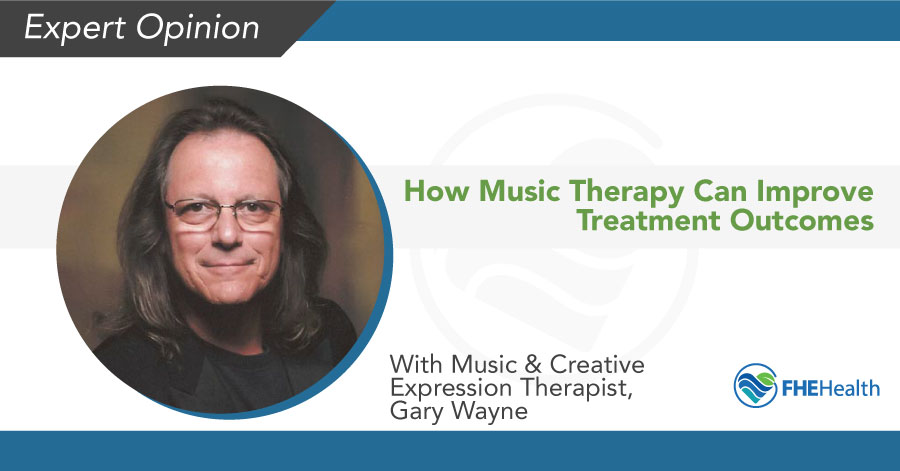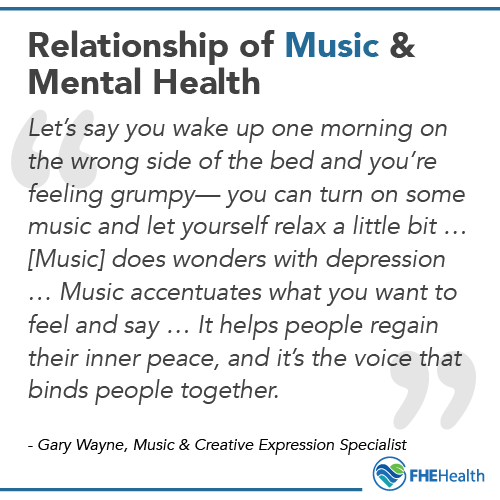
This article has been reviewed for accuracy by our peer review team which includes clinicians and medical professionals. Learn more about our peer review process.
Music & Creative Expression Specialist Gary Wayne is new to FHE Health but no stranger to music therapy as a means of treatment. As a lifelong musician, Wayne developed three other music therapy programs before coming to FHE Health. Now, he’s doing the same at FHE, having developed an innovative, creative arts therapy program that employs the healing powers of music and other performing arts in a peer support group setting and in our on-site music studio.
In a recent interview, Wayne spoke about how music therapy makes “rehab a more positive experience” and can also boost treatment outcomes. What follows are the highlights of that conversation, including answers to commonly asked questions about the therapeutic benefits of music therapy for people with substance use and mental health disorders.
The Relationship Between Music and Mental Health
 A conversation about music therapy for substance abuse treatment—and greater health and wellness, for that matter—naturally begins with an exploration of the relationship between music and mental health. Here’s how Wayne described that relationship:
A conversation about music therapy for substance abuse treatment—and greater health and wellness, for that matter—naturally begins with an exploration of the relationship between music and mental health. Here’s how Wayne described that relationship:
Let’s say you wake up one morning on the wrong side of the bed and you’re feeling grumpy— you can turn on some music and let yourself relax a little bit … [Music] does wonders with depression … Music accentuates what you want to feel and say … It helps people regain their inner peace, and it’s the voice that binds people together. That’s why everyone feels so great when they get “Happy Birthday” sung to them. (They either feel great or they feel embarrassed.) In hospitals, they play music in the background and their aim is to keep a calm environment. In a club, they play crazy music that will get people pumped up and excited where they are.
In other words, there is a very direct tie between the music we listen to and the thoughts and emotions we experience— and those thoughts and emotions can have a profound impact on our mental health in any given moment.
Wayne described a short exercise he often likes to do with his therapy groups: He’ll ask participants in the group to think of a song that makes them feel good and that they would like him to play; after playing the song, Wayne then asks members of the group to share how the song made them feel. According to Wayne, some patients’ responses included things like:
- “It took me back to a time when I was feeling good about myself.”
- “inspired”
- “calmer and more peaceful”
- “nostalgic”
How Music Therapy Is Good for Health and Wellness
 Music’s power to make people feel better (calmer, happier and more at peace) isn’t just related to mental health— it’s also linked to improvements in overall health and wellness. Consider the following moving story of a patient with throat cancer, whom Wayne worked with.
Music’s power to make people feel better (calmer, happier and more at peace) isn’t just related to mental health— it’s also linked to improvements in overall health and wellness. Consider the following moving story of a patient with throat cancer, whom Wayne worked with.
Before his diagnosis of throat cancer, the patient used to sing and play the guitar but by the time Wayne met him in treatment, the patient had given up playing and singing and “felt like he could never sing again.” With a little encouragement from Wayne, the patient agreed to come into the studio and record a couple of songs that he had written and composed.
“His voice wasn’t as good as it used to be but it had a rasp to it,” Wayne recalled. “He started playing guitar again … Here he had come into a treatment center and was now using music as a medium for processing grief and regulating moods and anxiety.”
The health and wellness benefits were immediate, according to Wayne, speaking of this patient: “When he got his guitar back his blood pressure went down.”
The Benefits of Music Therapy for Mental Health
What about the benefits of music therapy for mental health? Once Wayne begins listing these, it’s hard to believe they’re not unlimited. Wayne said “the most important benefit of music therapy is that it improves your mood” (as evidenced by patients’ experiences above).
Wayne also noted the following benefits of music therapy, based on his experience with patients:
- “[Music] helps improve your cognitive skills and memory capacity— especially playing a musical instrument.” (Wayne offers guitar, keyboard, drum and voice lessons to patients who would like them.) “You hear a song and then hear it again and want to play.”
- “It helps you calm down and focus … There are so many distractions that happen throughout the day. If you want to focus on finishing a task, then the music in the background can help with that task.”
- “Music is a great stress reliever in early recovery and in this sense can alleviate destructive cravings.” In particular, Wayne said that “music helps you recover from emotional stress—it soothes the souls of human beings of all ages.” (Emotional stress from trauma or other mental health diagnoses can be a major relapse trigger in early recovery.)
As an illustration, Wayne shared the real-life example of a former patient who “uses music when he can’t get in touch with his sponsor … his thoughts become clear and good … He goes on Spotify and says that when he has a trigger, the music helps him focus and withstand the cravings.”
- Music also fosters spirituality, which can be critical to recovery. “Music soothes the souls of human beings of all ages,” Wayne explained.
- And, “music strengthens self-confidence,” according to Wayne, who described how it encourages self-expression and self-development.
A Day in the Life of a Music Therapist?
 Curiously, a lot of people want to know what a music therapist really does. This interest in the job description of a music therapist and what their typical day looks like can carry over to the rehab context, too. People are curious about the day-to-day life of someone who uses creative arts therapy to help people in inpatient treatment for addiction and mental health disorders.
Curiously, a lot of people want to know what a music therapist really does. This interest in the job description of a music therapist and what their typical day looks like can carry over to the rehab context, too. People are curious about the day-to-day life of someone who uses creative arts therapy to help people in inpatient treatment for addiction and mental health disorders.
In Wayne’s case, he spends his mornings leading therapy groups. These consist of music and other fine arts groups, such as creative writing and improv, where patients have opportunities to explore the wide-ranging, therapeutic dimensions of these different, artistic mediums.
Wayne spends much of his afternoons in FHE’s on-site studio, working with patients on various musical works of art.
They come into the studio and they record a poem or sonnet, a song (whether a famous song or something they wrote), or audio message with music behind it … They’ll record a message to themselves … In some groups, I have them answer the question, “If you were a sponsor, what would you tell them?” and then I invite them to record their answer in the studio— and then they are their own sponsor.
In the studio, Wayne records patients playing and singing songs, whether their own compositions or their favorite hits. The studio is also where Wayne helps patients record heartfelt messages to their loved ones and/or to their future self as an encouragement to stay sober.
Sometimes patients will have written a story that they can then put into lyrical form in the studio with Wayne’s help. “Once it’s in lyrical form, we’ll put it to music; and once it’s put to music, we’ll record it in the studio,” Wayne said. “If someone has a poem, they’ll record the poem and talk into the microphone, record it and put music behind it.”
In the creative writing group that he leads, Wayne encourages members to “write a letter to themselves, so that once they get out of treatment they have it on hand in case they get a craving.”
“They record a message to themselves, and then I put whatever music they want behind it. Then, whenever they feel the urge to use, they can take out their phone and hear themselves reminding their own self about the reason they went to treatment.”
Just the other day, there was a patient in one of Wayne’s groups who was “totally depressed” and “in a very, very dark place.”
“I said, ‘Write whatever you want to write.’ This guy made something up about Sponge Bob and he came into the studio and recorded it … When he got done he was excited about it and enjoyed the whole process … Music is starting to play a pivotal role in his life. He’s incorporating the music therapy into his recovery.”
For Wayne, it’s the many stories like these that make an occupation in music therapy so greatly rewarding.






